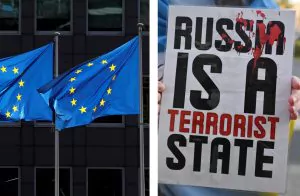Subscribe to our Telegram channel

New EU sanctions will ban the supply of laptops and hard drives to Russia
The new ninth package of EU sanctions against Russia in connection with its full-scale invasion of Ukraine is aimed at undermining the military-industrial complex of the terrorist state and affects a number of critical military industries.
The European Commission has proposed to expand the sanctions list of 169 organizations that supply goods to Russia «that may contribute to the technological improvement of the Russian defense and security sector.» The new restrictions include drone engines, chemical and biological equipment, riot control equipment, and electronic components.
The EU also wants to expand the list of sanctioned goods in the aviation and space industry to include aircraft engines and components, as well as laptops, hard drives, cameras and lenses.
A separate document with a list of new sanctions provides for the suspension of the broadcasting licenses of the Russian channels NTV/NTV Mir, Russia 1, REN TV, and Channel One. Another document proposes to impose sanctions against several Russian armed groups, including the commander of the neo-Nazi group Rusich, Yan Petrovsky, who is known for his racist statements about the superiority of the «white race» and maintains close ties with the Wagner PMC.
EU ambassadors and diplomats are currently discussing a list of new sanctions. It is expected to be adopted early next week. For the sanctions to take effect, they must be supported by all EU member states.
As a reminder, in the previous, eighth package of sanctions against the occupying country, the EU banned Russians from owning cryptocurrency wallets in the EU member states. Russian citizens will also not be able to store digital assets in the EU, regardless of the amount on the cryptocurrency wallet.
In turn, the fifth package of sanctions against Russia included a ban on the provision of services related to digital assets to residents of the occupying country. It was about deposits exceeding € 10,000. In late September, the US House of Representatives supported the Russia Cryptocurrency Transparency Act. After its final adoption by the Senate, Russia will not be able to defend itself against sanctions by using cryptocurrencies.

